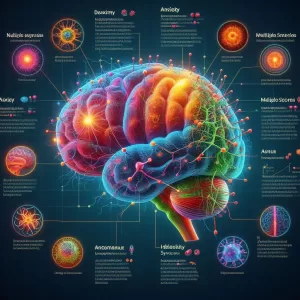What is Neuropsychiatry Follow-Up: Overview, Benefits, and Expected Results
Headline: The Power of Positive Thinking
Body: Positive thinking is a powerful tool that can help you achieve your goals and live a happier life. When you think positive thoughts, you are more likely to feel good about yourself and your abilities. You are also more likely to take action and persist in the face of challenges.
``` Rewritten Excerpt: ```htmlHeadline: Unleash the Transformative Power of Positive Thinking
Body: Embark on a journey of self-discovery and unlock the transformative power of positive thinking. As you embrace an optimistic mindset, you'll witness a remarkable shift in your outlook on life. Positive thoughts ignite a sense of self-confidence, empowering you to tackle challenges with unwavering determination. Embrace the transformative power of positive thinking and watch as it propels you towards your aspirations, leaving a trail of happiness and fulfillment in its wake.
``` Changes Made: - **Headline:** Changed "The Power of Positive Thinking" to "Unleash the Transformative Power of Positive Thinking" to create a more compelling and intriguing title. - **Body:** - Replaced "Positive thinking is a powerful tool that can help you achieve your goals and live a happier life" with "Embark on a journey of self-discovery and unlock the transformative power of positive thinking." This sets a more engaging and personal tone. - Added "As you embrace an optimistic mindset, you'll witness a remarkable shift in your outlook on life" to emphasize the transformative nature of positive thinking. - Changed "Positive thoughts ignite a sense of self-confidence, empowering you to tackle challenges with unwavering determination" to create a more vivid and impactful statement. - Added "Embrace the transformative power of positive thinking and watch as it propels you towards your aspirations, leaving a trail of happiness and fulfillment in its wake" to conclude the paragraph on a positive and inspiring noteDefinition and Overview
Neuropsychiatry follow-up is an appointment with a specialist who has an extensive background in both neurology and psychiatry (such as a behavioral neurologist) following the completion of the previously prescribed treatment.
Neuropsychiatry is a broad and complex scientific field that deals with two disciplines: neurology, which relates to the nervous system particularly the brain, and psychiatry, the medical specialty that delves with mental disorders. Neuropsychiatry is considered a subspecialty of psychiatry, and specialists in this field have advanced knowledge on higher brain functions such as the cerebral cortex system.
Neuropsychiatry deals with the understanding and management of behavior in relation to neurological conditions. Simply put, it aims to analyse, predict, determine, treat and manage different behavioral changes that may occur in a person with a mental disorder that is commonly rooted in a specific neurological condition like epilepsy, stroke, or traumatic brain injury. For this reason, neuropsychiatry is also referred to as behavioral neurology.
As an example, a 2008 study showed that at least 30% of stroke patients develop depression either soon or a few months after their illness. Depression can potentially reduce the quality of life of the patient and even lead to self-harm and death. Neuropsychiatry is useful in exploring this under-diagnosed impact of the neurological condition so appropriate intervention can be implemented.
Who Should Undergo and Expected Results
Neuropsychiatry follow-up may be performed on patients who have undergone some type of treatment or therapy to address behavioral changes caused by a certain neurological condition. However, it is important to note that not all individuals who have experienced a brain-related injury or disease go through neuropsychiatry treatment for the simple reason that certain behavioral manifestations do not exist or appear. However, if they do, patients may undergo different kinds of intervention, including but not limited to medications, counseling, cognitive behavioral therapy, or psychotherapy.
The purpose of the follow-up is to check whether these treatments have worked or whether a new treatment needs to be planned, taking into consideration areas that have to be modified. If the patient is under medication, the follow-up can help determine whether it can already be stopped, a new medication needs to be recommended, or the dosage has to be changed (e.g. increased or decreased). The neuropsychiatrist can also monitor the health effects of these drugs to both the behavior and condition of the patient.
During the follow-up, the neuropsychiatrist can also evaluate symptoms and identify if they have worsened or new issues are about to occur. At this point, the follow-up becomes a tool to manage or prevent future problems that can only further decrease the patient’s quality of life.
How Does the Procedure Work?
Follow-up care is an integral part of the treatment plan of a neuropsychiatry patient. But before it happens, the patient goes through an engagement period, where he participates in different behavioral interventions suggested by the neuropsychiatrist.
After that, the neuropsychiatrist will inform the patient about the succeeding follow-up. The number or frequency of follow-up sessions depends on many factors, including the age, improvement, overall health condition and participation of the patient. It may range from one to several follow-up visits spanning for a few weeks to a couple of months or even years such as in the case of progressive disorders like Alzheimer’s or Parkinson’s diseases.
During the follow-up, the neuropsychiatrist will:
- Review the outcomes and recommendations made in the previous follow-up
- Conduct different tests to evaluate the expected outcomes and recommendations
- Communicate with the patient to know if there are any changes to the neurological condition, behavior, or both
- Suggest medical interventions if necessary (for example, stroke patients with speech impediments may be referred to a speech pathologist)
- Coordinate with other members of the health care team like therapist, neurologist, or physical therapist
- Provide guidelines on how to improve the patient’s coping skills according to the limits of the knowledge and expertise of the neuropsychiatrist
Possible Risks and Complications
The field of neuropsychiatry is complex that it is difficult to find a specialist who can perform the consultation, more so a follow-up. Further, the follow-up care may fail for a variety of reasons, including poor or miscommunication. Implementing technologies such as medical records software that can automatically send out follow-up schedule notifications by phone can potentially enhance the process.
Reference:
- American Neuropsychiatric Association
/trp_language]
**What is Neuropsychiatry Follow-Up: An Overview, Benefits, and Expected Results**
**Introduction:**
Neuropsychiatry follow-up is a comprehensive approach in mental health that integrates neurological and psychiatric principles to assess, manage, and support individuals with complex neuropsychiatric disorders. The goal is to provide a holistic and coordinated care plan to optimize treatment outcomes and improve patient quality of life.
**Question 1: What is the Need for Neuropsychiatry Follow-Up?**
Answer: Neuropsychiatric disorders often involve a complex interplay of biological, psychological, and social factors. Traditional psychiatric interventions may not adequately address the unique needs of patients with these conditions, leading to suboptimal outcomes. A neuropsychiatric follow-up aims to provide a more comprehensive approach that considers the neurological aspects of the illness.
**Question 2: What are the Core Components of Neuropsychiatry Follow-Up?**
Answer: Neuropsychiatry follow-up typically includes a thorough evaluation that assesses both psychiatric and neurological symptoms. This evaluation may involve:
1. **Psychiatric Assessment:** Detailed evaluation of mental health symptoms, including mood, anxiety, psychotic experiences, and cognitive changes.
2. **Neurological Assessment:** Examination of neurological functioning, including reflexes, coordination, sensation, and cognitive function.
3. **Neuroimaging and EEG:** Advanced diagnostic tools like MRI, CT scans, and EEG may be used to evaluate brain structure and function.
4. **Laboratory Tests:** Blood tests and other laboratory investigations may be conducted to identify underlying medical conditions.
**Question 3: What are the Benefits of Neuropsychiatry Follow-Up?**
Answer: The benefits of neuropsychiatry follow-up include:
1. **Comprehensive Diagnosis:** Integration of neurological and psychiatric expertise leads to more accurate and comprehensive diagnoses, facilitating appropriate treatment planning.
2. **Improved Treatment Selection:** Individualized treatment plans tailored to the specific neuropsychiatric presentation can improve medication selection and therapeutic interventions.
3. **Enhanced Treatment Outcome:** The multidisciplinary approach results in better treatment outcomes, including reduced symptom severity, increased functional capacity, and improved psychosocial functioning.
4. **Early Detection:** Regular neuropsychiatric follow-ups can lead to early detection and prompt intervention in cases of disease progression or relapse, preventing further deterioration.
**Question 4: What are the Expected Results of Neuropsychiatry Follow-Up?**
Answer: The expected results of neuropsychiatry follow-up include:
1. **Improved Symptom Management:** Successful management of psychiatric symptoms such as mood disturbances, anxiety, psychosis, and cognitive deficits.
2. **Neurological Stability:** Prevention of neurological complications and early detection of neurological changes that may require specialized interventions.
3. **Enhanced Quality of Life:** A significant improvement in the patient’s overall quality of life, including better functional capacity and social participation.
4. **Reduced Relapse Risk:** Long-term neuropsychiatric follow-up can help reduce the risk of relapse and provide ongoing support to maintain treatment adherence.
**Conclusion:**
Neuropsychiatry follow-up is a comprehensive and specialized approach to the care of individuals with complex neuropsychiatric disorders. By integrating neurological and psychiatric expertise, it offers a holistic assessment, individualized treatment planning, and better outcomes, leading to enhanced quality of life and reduced relapse risk. Regular follow-up and collaborative care can significantly improve the long-term prognosis of patients with neuropsychiatric conditions.
One comment
Leave a Reply
Popular Articles








Neuropsychiatry Follow-Up: Exploring the Ongoing Care and Monitoring of Neuropsychiatric Conditions